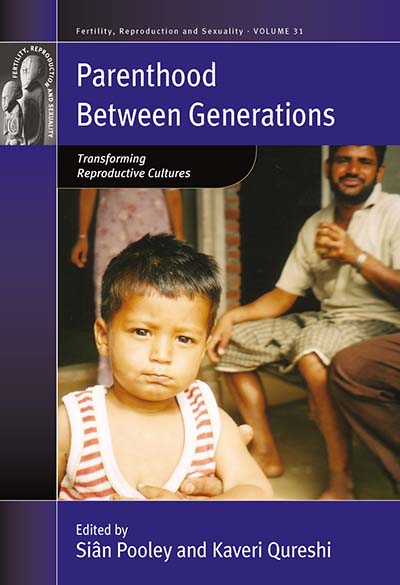(This post was originally published in 2016)
by Siân Pooley and Kaveri Qureshi
On the 2nd March this year, ahead of Mother’s Day, there was a thoughtful discussion on Radio 4’s Woman’s Hour addressing the question: ‘is it inevitable you’ll turn into your mother?’. For counsellor Myira Khan, who was interviewed on the programme, this is a topic that comes up frequently in her therapy sessions. Indeed, for women who have struggled with their relationships with their mothers, it can be a source of great conflict. Khan claims that ‘you’re turning into your father’ is not a jibe for men in the same way that ‘you’re turning into your mother’ so often is for women, and that men do not worry about this to the same extent. She suggests that because our mothers are our role models for womanhood, this gives mother-daughter relationships a particular charge. A lot of her counselling work with women is about trying to ‘break the cycle’, which she approaches therapeutically by exploring mother-daughter relationships, trying to understand what those relationships mean, and encouraging women to accept the reality of who their mother really was, rather than the awe-inspiring model of her that they have in their minds.
This programme made us pause for thought, as it was broadcast just ahead of the publication of our book Parenthood Between Generations: Transforming Reproductive Cultures. In this edited volume we bring together ten contributions by historians, anthropologists and sociologists addressing precisely the extent to which people replicate the models of parenthood that they encounter from their own parents. Our studies canvass historical periods of up to a century; different country contexts, from Africa to Britain to China, Japan, South Asia, the Caribbean and the Brazilian Amazon; and contrasting family circumstances, from nuclear families to extended families, reconstituted families, matri-focal families, queer families and out-of-wedlock single parent families. We listen to non-expert voices, working class and minority opinions and experiences. In fact, our studies document plenty of men worrying that they are turning into their own fathers. Nonetheless, our studies underscore the importance of the Radio 4 debate, as they demonstrate, across the board, the fundamental influence of older generations of kin in shaping the bearing and rearing of children.
Even in a contemporary globalized and connected world, we find this to be no less the case for those people who stay in one place, than it is for those who migrate and therefore put significant geographical distance between themselves and their parents. We also find that, consistently, the women and men with the most influence in shaping how children are cared for are those who are most spatially, physically and constantly present as a child is cared for and brought up. Our finding, that older generations of kin influence child-bearing and child-rearing more profoundly than parenting experts, offers a powerful critique of seductively linear narratives about the ineluctable rise of medical and state authority.
That doesn’t mean that we are all destined to turn into our own parents, however. Our volume suggests that in fact, nobody ever straightforwardly replicates the models of parenthood that they receive. There are mothers and fathers in our chapters who claim to be doing this, who make positive claims about emulating the models of parenthood that they received from their own parents. Yet by virtue of being able to supplement interview studies with longitudinal insights, anthropological observation and fragments of less coherently self-managed historical archives, we identify slippages. Usually people become parents in such strikingly different circumstances to their own parents – because of economic change, for example, or because of migration, or vicissitudes of family life like mortality, divorce, pregnancy outside marriage or stories of ‘coming out’ – that they cannot simply fall into their footsteps. Equally, there are mothers and fathers in our chapters who claim to be rejecting their parents and ‘breaking the cycle’, yet they are unable to erase their inheritances from their parents. People transpose, rather than replicate their pasts.
Beyond documenting the mere fact of intergenerational transmission, our volume offers a more searching insight. We offer a typology to approach how models of parenthood get passed between generations, as well as what gets silenced or stopped. We explore the power of implicit, rather than explicitly stated normative expectations in shaping people’s orientations and convictions about parenthood; the force of explicit moral judgements; the subtle and often in-articulable process of habituation; and the influence of memories and their telling and re-telling.
Finally, our studies examine parenthood as a lifelong relationship with the power to enduringly affect the decisions of adult men and women. Motherhood and especially fatherhood do not diminish when children grow up, but may in fact be enhanced. In the radio programme, interviewer Jane Garvey observes that ‘whether we like it or not, we are always children, aren’t we’. This is because there is a simultaneity of generational roles within individual lives. Parenthood is, we suggest, necessarily a state of complex and messy intergenerational entanglement, whose implications for children, parents and grandparents alike have only just begun to be explored.
To read Introduction to Parenthood Between Generations click here.
Siân Pooley is a Tutorial Fellow in Modern British History at Magdalen College and an Associate Professor in the Faculty of History, University of Oxford. Her research explores the social and cultural history of Britain since 1850, especially through the experiences, relationships, and inequalities that mattered to children, men, and women. She is currently working on parenthood, children’s writing, and experiences of maltreatment in childhood.
Kaveri Qureshi is a Research Fellow at the Institute of Social and Cultural Anthropology, University of Oxford. She works on Pakistani and Indian diasporas as well as in Punjab. She has research interests in migration, gendered life courses, family life, and how people deal with transitions—from an episode of incapacitating illness, to the breakdown of a marriage, to becoming a mother for the first time.

